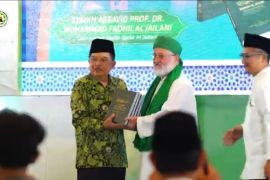"The import quota for Bulog has not been decided. We are still discussing and studying it. We hope with the correct volume of quota the price could be stabilized," Trade Minister Gita Wirjawan said.Jakarta (ANTARA News) - The Trade Ministry continues to discuss proper beef import quota for the state logistics agency Bulog so that the price of the commodity at home could be lowered, Trade Minister Gita Wirjawan said.
"The import quota for Bulog has not been decided. We are still discussing and studying it. We hope with the correct volume of quota the price could be stabilized," the trade minister said here on Tuesday.
Bulog is still waiting for a legal umbrella on its assignment as a beef price stabilizer. The logistics board needs some 28,000 tons of beef to stabilize domestic prices.
"They have expressed their aspirations with regard to the beef quota. We will discuss it and try to find a meeting point," Minister Gita said.
Gita explained that price stabilization measures on beef prices were to be launched not because of nearing fasting month of Ramadhan but because the government wanted to continue its stabilization policy as it did in 2012.
"I want that the average beef price will not be too far from the price in 2012 which was at a range of between Rp75,000 and 76,000 per kg. The average price now is still at Rp90,000 per kg," the minister said. The price is increasing from the previous Rp60,000 (US$6.2) late last year.
Based on data available at the Central Bureau of Statistics (BPS), the beef price in the fourth week of January 2013 was recorded at Rp90,000 (US$9.33) per kg.
This price has been in that level since the first week of December 2012. It was said that the beef price in Indonesia now was the most expensive in the world.
The World Bank recorded that the average beef price per kg in Indonesia in December 2012 was US$9.76 while prices per kg in Malaysia was US$4.3, in Thailand US$4.2, In Australia US$4.2, in Japan US$3.9, in Germany US$4.3 and in India US$7.4.
On Sunday, May 19, Bulog President Director Sutarto Alimoeso said that Bulog has to control seven to ten percent of imports (of meat) if it wanted to stabilize prices. This is based on its experience in stabilizing rice prices.
"The quota should account for seven to ten percent of the total imports, or about 28,000 tons but meat is different from rice," Sutarto said.
He said that Bulog was now preparing itself with regard to its assignment to stabilize beef prices at home.
"Bulog should not function as a fire brigade, which acts only when prices are increasing. It should make clear its overall functions," he said.(*)
Editor: Heru Purwanto
Copyright © ANTARA 2013











